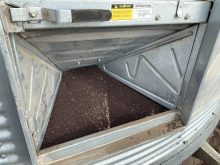Manitoba Ag Days isn’t just the premier agricultural show in Manitoba; it’s also a fun and educational field trip destination.
Agriculture in the Classroom (AITC) brings 150 to 200 Grade 7 and 8 students to the show each day from schools across Manitoba, providing them a unique opportunity to learn more about the people who grow their food and the many career options that the agricultural industry offers.
“I think Ag Days is a great venue to bring young people to because it is very dynamic,” says Johanne Ross, executive director of AITC – Manitoba Inc. “It really opens their eyes to the fact that agriculture is not just about farming, that it is so much more.”
Read Also

Gene editing up a better canola crop: FEATURE
Gene editing techniques and maize genetic material may be the seed for more robust and stress tolerant canola plants. Canadian research is trying to make it happen.
The morning program includes a direct educational piece with AITC, which provides teachers with resources and ideas to be able to continue the education back in the classroom across many aspects of their school curriculum.
Colleen Berard, a teacher at Westmount School in Swan Lake, feels the biggest value for her students is the interactive morning classroom activities, such as the World Game, where they are broken up into groups and “populate” different countries.
“They get a real taste of what it would be like to live in highly populated countries,” says Berard, who adds that the overall experience is very beneficial and helps them to realize the importance of agriculture to everyone.
Think global, act local
The theme for 2012 is “think global, act local,” a reminder that agriculture in Canada isn’t just about feeding ourselves. “It’s about us meeting the challenge to feed the world,” says Ross. “We are encouraging the students to think in a world environment in which agriculture plays a huge role, but also about what they can do from a local standpoint to help contribute to that.”
Organizers say that there is always a waiting list of schools wanting to participate in the program, and finding industry partners to help out is never a problem.”
We have a super group of partners that help us out with this event and are returning every year, so it’s been a really positive thing for them too,” says Ross. “They all provide a stop on the scavenger hunt, which is held in the afternoon. Students will visit their displays to either find an answer to a themed question related to their business or do an activity at the booth. They are able to interact with the people at the display and come away with a key message from that industry partner.”
A long-standing industry partner is the Manitoba Canola Growers Association (MCGA), which loves to connect with kids about agriculture and canola, says MCGA’s education and promotions co-ordinator, Ellen Pruden.
“MCGA participates in as many programs as possible that connect with youth. The value for MCGA is giving exposure to kids about agriculture,” she says. “The kids learn through a hands-on approach, so it’s a two-way interaction of learning. The kids learn, so does the staff and our growers.”
Green seeds
At the Manitoba Canola Growers roadblock, the kids must crush canola and determine if there are too many green seeds in their sample. It’s a real-life activity that growers do and the kids have the opportunity to meet and talk with canola growers at the booth.
“Each time a group of kids stops in, we take the time to talk with them, do the activity, explain how one tiny canola seed is jam packed with canola oil that gets crushed out by the crushers,” says Pruden. “We also talk to them about canola being a local, healthy oil and when the growers are talking to the kids they explain that they are the ones who grow canola. It’s a chance to put a face to farming.”
It’s the part of the day that her students probably enjoy the most, says Berard. “The kids love it, and they especially like the challenge of the Amazing Ag Race in the afternoon,” she says. “They like to visit the booths and compete with each other to answer the questions they are given.”
The AITC event at Manitoba Ag Days also ties in well with the social studies, math and science curriculums says Nicole Bileski, a teacher from Gilbert Plains School who regularly attends the program.
“All curriculums have aspects of agriculture that is regularly touched on in the classroom and this field trip makes it all real for the students, which is ultimately one of the best ways to learn,” she says. “Students thoroughly enjoy this field trip and come away with positive attitudes towards agriculture in our province and the world.”


















